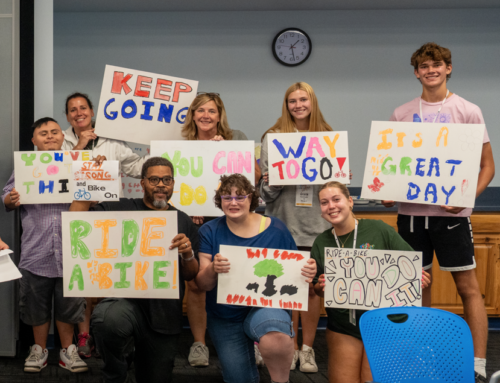Beth Ann Geyer never imagined herself accepting an award in front of a room of nearly a hundred people.
She improvised an acceptance speech where she expressed her gratitude and thanked her employer, Pizza Hut, for the opportunity to work and earn a living.
Beth Ann, who has recognized for working for Pizza Hut for 28 years, is an example of how individuals with intellectual and developmental disabilities can make strong and loyal additions to the workplace.
Beth Ann was one of 24 employees who were formally recognized for their hard work and dedication at ADEC’s inaugural Community Employment Luncheon on Friday, Oct. 4. Elkhart County leadership was also there to show appreciation for the employers who gathered at the event.
Meeting employment needs head-on
Jordan Shankster counted himself among those who were recognized at the event for their work. He has worked at EFP Corporation in Elkhart for the past few years.
“We make things like coolers, insulation and faux-block panels used in the construction trade,” Jordan said. “Currently they have me grinding foam. I’m an all-around guy.”
Susan Faltynski is the employment services manager at ADEC. She views ADEC’s relationship with EFP as a good opportunity for Jordan and an example of the kind of community collaboration that can challenge assumptions while meeting the needs of employers and job seekers.
“Often, when people imagine what kinds of jobs may suit an individual with an intellectual or developmental disability, they think of cart pushers, stockers or greeters,” Susan said. “Sometimes that kind of thing does end up being the right fit, but frequently the individuals we serve are eager to learn new skills and get into more advanced positions.”
Susan explained that industries facing challenges with turnover often learn that these individuals can be among the most dependable and loyal employees a company may have, making them a great untapped resource for employers.
“EFP has been great about opening their doors for our clients to be able to see the possibilities that may be out there in industries that maybe they hadn’t considered before,” Susan said.
As a job coach for workers with intellectual and developmental disabilities, ADEC’s Mike Hedrington has been there to help Jordan navigate some changes at EFP.
“After EFP saw some turnover and hired a new production manager, it became important for me to stay in touch with that manager in case any adjustments were necessary to help Jordan adapt,” Mike said. “In the face of these challenges, Jordan has done a very good job.”
Despite the challenges, working at EFP has helped Jordan to be able to contribute to his household.
“The money I earn helps me live life, keeps me fed and puts gas in the tank,” Jordan says.
Employers recognized by local leadership
Employment is one of the main pillars of what we do here at ADEC, because we believe individuals with intellectual and developmental disabilities deserve the opportunity to find a sense of purpose and a paycheck in work. They deserve the chance to be taxpaying citizens and contribute to the wellbeing of their community.
But it’s not that easy – a lot of employers still don’t recognize that individuals with disabilities can make strong contributions to the workplace. The luncheon celebrated the 24 companies who have made that discovery and celebrated the relationship that they have built with their employees with disabilities, including representatives from area employers like EFP, Dometic, Kroger, East Lake Nursing & Rehabilitation Center, Mancino’s Italian Eatery, the Electric Brew, Furnitureland, Sports Time Bar & Grill, and Hardwoods Specialty Products.
Levon Johnson, president of the Greater Elkhart Chamber of Commerce, gave the keynote speech at the luncheon and expressed gratitude for the contributions of the Elkhart County employers who were present at the event and emphasized the importance of employer collaboration in service of community need.
“In my position I know that Elkhart County has a 3 percent unemployment rate overall,” Levon said, “but in some neighborhoods, where transportation is a huge challenge, that rate is more like 7 to 8 percent,”
Levon went on to explain that, while he thought the trolley system in Elkhart was nice, it didn’t always run at the right times or to the right places. To him, this was an example of why employers coming together as partners in the community is so important, so that we can work together to solve problems and help those in need.
According to the Bureau of Labor Statistics, the unemployment rate for individuals with intellectual and developmental disabilities can be twice as high as the general unemployment rate. Considering these individuals tend to exhibit the kind of loyalty and strong work ethic employers struggle to find, employers would be remiss to consider ADEC clients as potential assets to their businesses—especially considering ADEC provides on-the-job support for these individuals.
A higher importance
Collaboration between ADEC and Elkhart County employers is critical to the success of the individuals ADEC serves. Beyond that, these relationships are vital lifelines for some people with disabilities, according to Susan.
“Many of the individuals we serve come to us worried about losing their homes or their ability to contribute to their households,” Susan said. “But we know from experience that inclusive communities are higher-functioning ones.”
In his speech, Levon pointed to ADEC’s downtown location in the heart of the city of Elkhart to show that the city is working to be an inclusive community that values all its citizens, and that: “while we may not be perfect, we’re always working on it.”
More than being just a job, the people who find work through ADEC’s Community Employment program find friendship and a sense of belonging to something greater.
“With a little hard work from our clients and collaboration with these employers, these individuals find that they can pay their bills and contribute to their communities, and individuals whose lives were set back by accidents are able to get back on their feet,” Susan said. “For many of the individuals we serve, there is a sense of pride in what they’re able to do.”
Beth Ann can attest to that with her 28 years working at Pizza Hut. She said it best with a silent, heartfelt embrace with her former supervisor at Pizza Hut.o consider ADEC clients as potential assets to their businesses—especially considering ADEC provides on-the-job support for these individuals.










